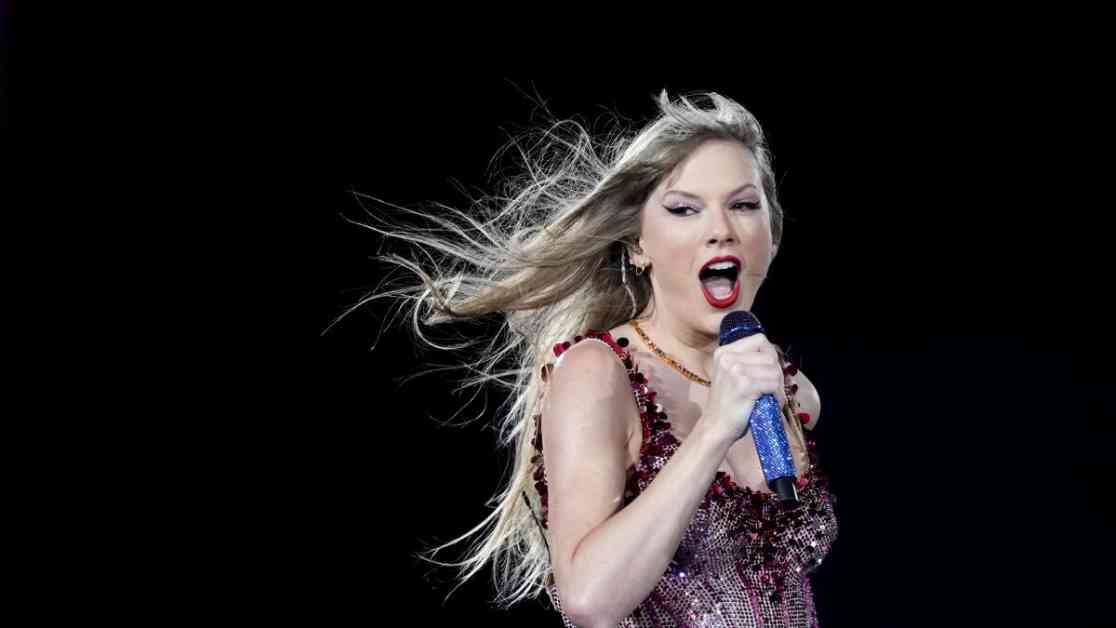Unraveling the Mystery: Taylor Swift and the Undecided Voter
In a country as politically charged and divided as the United States, the existence of the undecided voter may seem like a myth, akin to leprechauns or mermaids. However, recent polls have shown that these elusive individuals do indeed walk among us, blending in until caught on camera during a post-debate panel. For those deeply entrenched in politics and pop culture, the idea of someone not having a firm opinion on Taylor Swift may be perplexing. Yet, shockingly, a significant portion of likely voters still remain undecided about the iconic singer.
A recent presidential poll conducted by the New York Times, Philadelphia Inquirer, and Siena College revealed that 22% of likely voters nationally either did not know how they felt about Taylor Swift, declined to share their opinion, or were unaware of who she was altogether. This poll compared Swift’s favorability ratings to those of Vice President Kamala Harris and former President Trump, following Swift’s endorsement of Harris in September. Despite not being physically present at any debates or having her music played during the political discourse, Swift’s influence and impact were still felt.
Among those surveyed, 44% expressed favorable views of Taylor Swift, who is currently in a relationship with Kansas City Chiefs tight end Travis Kelce. The couple’s budding romance has garnered attention and speculation, especially considering Swift’s tumultuous history of heartbreak, which has been immortalized in her music. Songs like “Last Kiss” and “Death by a Thousand Cuts” serve as poignant reminders of her past relationships and personal struggles, resonating with fans around the world.
On the flip side, 34% of those polled held unfavorable opinions of Taylor Swift, showcasing a divide in public perception. Despite her immense popularity and musical success, there are still individuals who remain indifferent or critical of the singer. However, Swift’s unfavorability rating pales in comparison to that of both Vice President Harris and former President Trump.
In a recent social media post, Trump expressed his disdain for Taylor Swift, declaring, “I HATE TAYLOR SWIFT” on his Truth Social platform. The Harris-Walz campaign swiftly responded with a clever retort, referencing 28 of Swift’s songs to highlight Trump’s behavior and character. The back-and-forth banter between political figures and a pop star may seem unconventional, but it underscores the intersection of entertainment and politics in today’s society.
Despite the abundance of information available on social media platforms, some voters may still find themselves undecided on key issues, including Taylor Swift’s stance on political matters. For those in need of a quick recap, Swift has been vocal about her opposition to former President Trump, accusing him of perpetuating white supremacy and racism throughout his presidency. In contrast, Trump has labeled Swift as “unusually beautiful” but politically liberal, attempting to paint her as a supporter of his administration.
While the feud between Trump and Swift continues to make headlines, it is essential to focus on the broader implications of their interactions. When compared to Vice President Harris and former President Trump, Taylor Swift’s favorability ratings remain relatively high, reflecting her widespread appeal across different demographics. With 70% of Democrats viewing her favorably compared to 23% of Republicans, Swift’s influence transcends traditional party lines, resonating with a diverse audience.
The question remains: are undecided voters truly undecided, or do they only reveal their uncertainty during high-stakes moments like elections? The mystery of the undecided voter persists, leaving many observers baffled by their indecisiveness on seemingly straightforward issues. Despite the wealth of information available, some individuals may struggle to form definitive opinions, leading to a state of ambiguity that is both perplexing and intriguing.
As the political landscape continues to evolve, the role of pop culture icons like Taylor Swift in shaping public opinion cannot be understated. Whether through endorsements, social media posts, or public statements, Swift’s influence extends far beyond the realm of music, impacting political discourse and societal norms. While the undecided voter may remain an enigma, their presence serves as a reminder of the complexity of human decision-making and the diverse perspectives that shape our political landscape.
The Impact of Celebrity Endorsements
Celebrity endorsements play a significant role in shaping public opinion and influencing voter behavior. When Taylor Swift publicly endorsed Vice President Kamala Harris, it sparked a conversation about the intersection of entertainment and politics. Swift’s endorsement highlighted her commitment to social justice issues and her willingness to use her platform for advocacy. As a prominent figure in the music industry, Swift’s endorsement carries weight and can sway public opinion, especially among her dedicated fan base.
The Power of Social Media in Politics
Social media has become a powerful tool for political communication, allowing candidates, celebrities, and ordinary citizens to engage with a global audience. The exchange between President Trump, Vice President Harris, and Taylor Swift on social media showcases the influence and reach of these platforms. Swift’s ability to respond to political figures and shape public discourse demonstrates the evolving nature of political communication in the digital age. As social media continues to play a central role in politics, the impact of celebrity voices like Taylor Swift’s will only grow stronger.
Navigating Political Divides through Pop Culture
Pop culture has the unique ability to bridge political divides and foster dialogue among individuals with differing viewpoints. Taylor Swift’s music and public persona have transcended traditional party lines, attracting fans from all walks of life. Despite her polarizing reputation, Swift’s influence extends beyond music to encompass social issues and political discourse. By navigating political divides through pop culture, Swift has become a unifying figure in an increasingly divided society, proving that music can transcend political differences and bring people together.
In conclusion, the mystery of the undecided voter remains a fascinating enigma in today’s political landscape. While some may struggle to form opinions on complex issues like Taylor Swift’s political affiliations, the broader impact of celebrity endorsements and social media engagement cannot be ignored. As pop culture continues to intersect with politics, figures like Taylor Swift will play a pivotal role in shaping public opinion and influencing voter behavior. Whether undecided voters remain enigmas or simply reveal their uncertainty at pivotal moments, their presence underscores the complexity of human decision-making and the diverse perspectives that shape our political discourse.



























